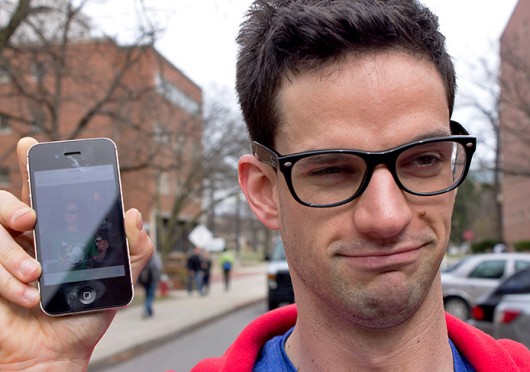
Andy Brennan holds up his iPhone with a photo of what he used to look like. Brennan was in a near-fatal car accident that he said was a turning point in his life.
Credit: John Wernecke / Lantern photographer
Andy Brennan stumbles a little on pocked, uneven pavement outside a crowded campus bar. He is already expecting scrutiny from the door guy.
The bouncer looks skeptically from the chubby, wild-haired man on the ID, to the trim, clean-cut man wearing black spectacles in front of him. They look like two different people.
Brennan, a third-year in business at Ohio State, said he understands the incredulity of strangers. If someone had shown him two and a half years ago what his life would be like today, he wouldn’t have believed it either.
At about 12:50 a.m. on Oct. 12, 2011, Brennan, then 24, was ejected from the back of a friend’s motorcycle when it crashed while going approximately 120 mph. Neither of them were wearing helmets.
The driver of the motorcycle and Brennan’s childhood friend, Aaron Richard Miller, 24, was pronounced dead at the scene.
Brennan was rushed to a hospital in critical condition.
“I don’t know how long I was in a coma, but I think it was a week after the accident, I remember coming to a little bit and my dad basically said, ‘You were in a motorcycle accident and they had to amputate your leg,’” Brennan said. “I remember saying something like, ‘Why’d they scrape me off the road?’”
Brennan also sustained bruises to his lungs, breaks throughout his thoracic spine, which is the middle portion of the spine, a severely broken right leg and a severe diffuse axonal injury, which is the tearing of the brain’s connecting nerve fibers that happens when the brain shifts and rotates inside the skull.
The doctors were initially unsure of the extent of his brain damage, Brennan said.
“They didn’t think I’d live to see November,” Brennan said. “My memory is all messed up, but I remember a doctor sitting down with my dad and I, and the doctor told my dad I would be in a nursing home for the rest of my life.”
Brandon Scott, Brennan’s best friend since first grade, went to visit him while he was still comatose, about 72 hours after the accident.
“I imagine he wanted answers from me, yet he wasn’t able to communicate to find out what was happening,” Scott said. “It was certainly heartbreaking because I always have answers for him, no matter if it’s what he wants to hear or not.”
After emerging from a coma, Brennan made an unexpected recovery.
Within six months of the accident he was living on his own, walking using a prosthetic leg and working. It was a turnaround from his life before the crash, Brennan said.
“Before the accident, I was just treading water,” Brennan said. “I was out of school and if I wasn’t drunk, I was hungover at work.”
Since the accident, Brennan has lost about 80 pounds, has stopped drinking and smoking and has focused on school.
“It’s a double-edged sword because I like where I’m at but I hate how I got here,” Brennan said. “I’m just a regular guy trying to un-screw-up all the years I spent drunk.”
Ali Ball, who has been friends with Brennan for about seven years, said she initially feared the accident would impact the rest of his life in a negative way, but quickly found the opposite to be true.
“Andy’s confidence levels are through the roof now, and he was not like that at all before the accident,” Ball said. “The accident was awful, but there is an incredibly thick silver lining because he has truly changed for the better.”
Ball said Brennan’s positive attitude often results in his using humor to diffuse other peoples’ awkwardness about his prosthetic leg.
“Drunk people are always like, ‘That’s a cool leg!’ but I like to joke and say, ‘it’s cool, but I liked my old one better,’” Brennan said.
Brennan said he doesn’t mind talking about his prosthetic, but he would like to be treated as any other person.
“Everyone always tells me that it doesn’t matter, but when strangers come up to you all the time after they figure out you have a prosthetic, you start to realize they are just talking to you because of your leg,” Brennan said.
Although having one leg is difficult, Brennan said the brain injury is often harder to explain. He said he faces challenges with recalling people’s names, remembering appointments and focusing.
“It’s obvious that I have one leg, but there’s no physical indicator that lets people know I have a brain injury,” Brennan said.
Brennan said, though, he mostly keeps his mind focused on the future.
“If I allowed myself to dwell on things, I think I would be angry about what happened,” Brennan said. “But my mindset since the accident is that if there’s something that I can’t fix right now, or that I can’t do anything about, it’s wasted energy to think about it.”
Brennan said he is still working on processing everything that has happened as a result of the accident.
“I have a friend who said life is 10 percent what happens to you and 90 percent how you react to it,” Brennan said. “I’m still just reacting.”
![Ohio Gov. Mike DeWine signed Senate Bill 1 — a higher education overhaul bill — into law Friday. [Ohio Gov. Mike DeWine speaks at the State of the State address in Columbus. Credit: Joshua Gunter via TNS]](https://www.thelantern.com/files/2025/03/20250204-AMX-US-NEWS-DEWINE-BUDGET-INCREASES-TAXES-FOR-1-PLD-384x253.jpg)

